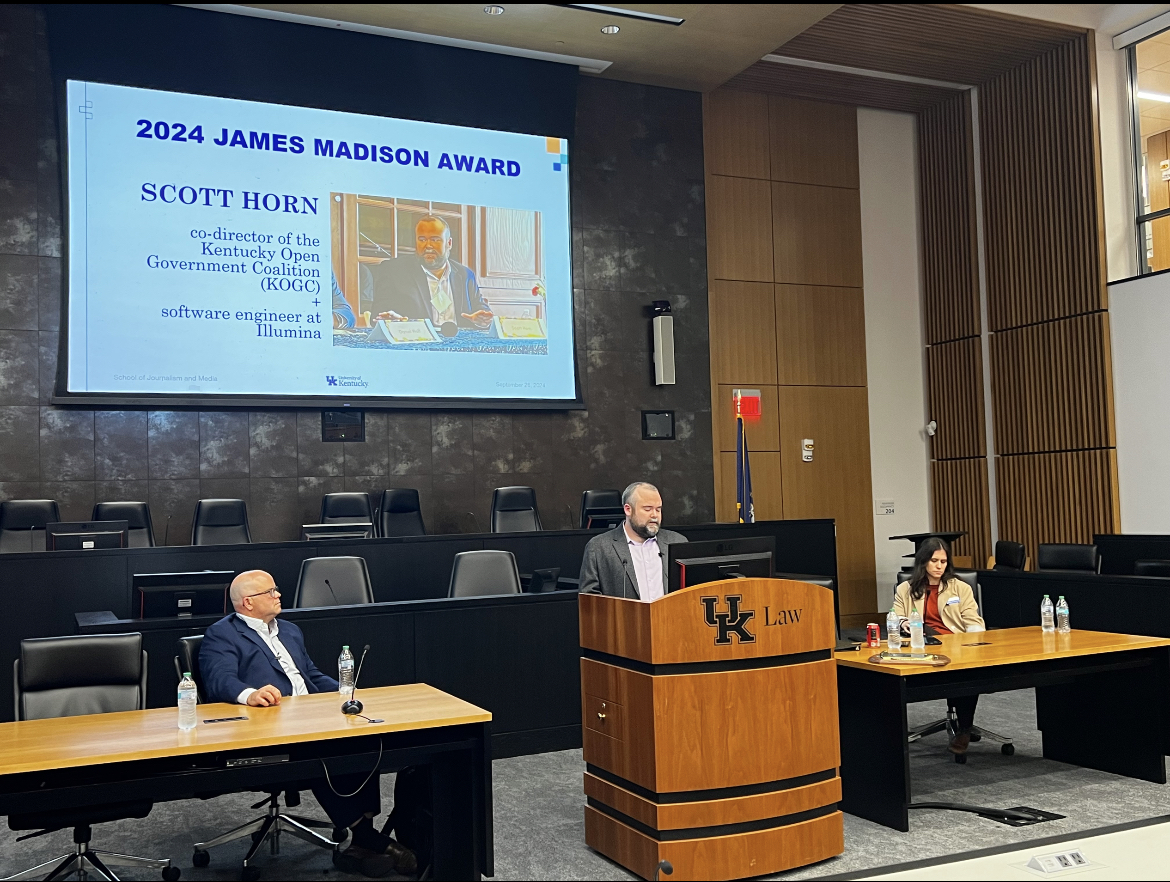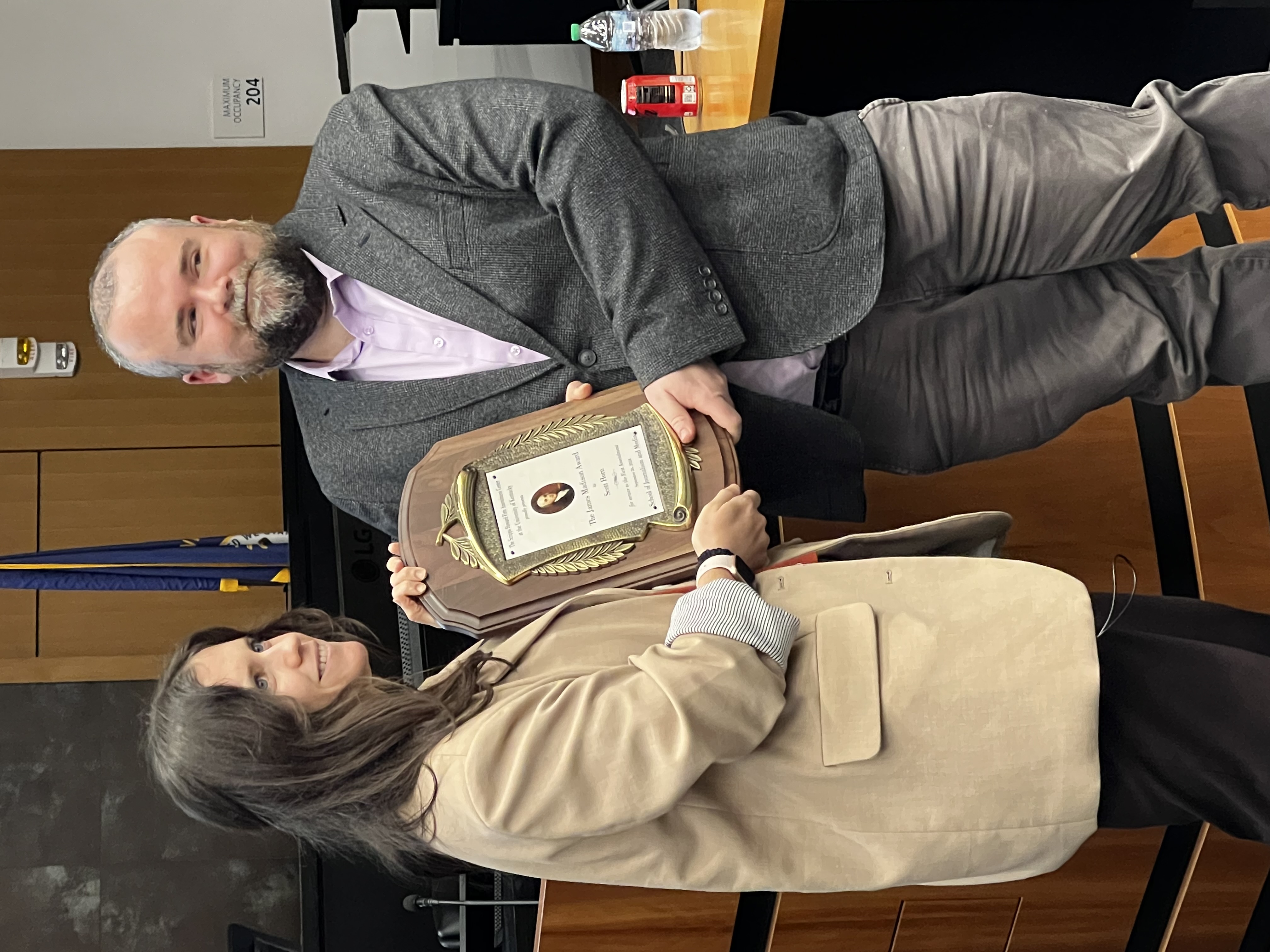

Our heartfelt congratulations to friend and Kentucy Open Government Coalition co-director, Scott Horn, who offered these remarks in accepting the 2024 University of Kentucky Scripps Howard First Amendment Center James Madison Award on September 26:
"Thank you very much. I am incredibly honored to receive the James Madison Award this year. It is deeply humbling to be listed alongside so many remarkable individuals who have made such significant contributions to our commonwealth. We have at least a couple of them with us tonight, including tonight’s speaker, Michael Abate, and my co-director Amye Bensenhaver.
"I would like to give special thanks to UK’s College of Journalism, to Katie Montalbano & to the Award Panel for selecting me for this honor. I also want to thank my friend and co-director, Amye Bensenhaver, a stalwart supporter of open government. I’m sure many of you have spoken with Amye in the past, and she willingly helps anyone across the state in better understanding our sunshine laws. I also want to thank our other co-directors in the Kentucky Open Government Coalition for their continued support: Jennifer Brown, Jeremy Rogers, Austin Horn, Tom Kiffmeyer.
"And I want to especially thank my partner, Owen, and my mother, Robin, for both their encouragement and their endurance of my sometimes maniacal spirit. One of my good friends who read the award announcement highlighted the word "unrelenting" as describing my open records fixation in a particularly accurate way. And, for that, I am truly thankful to my loved ones for keeping me grounded and supporting me through my muckraking antics.
"The Coalition and I are very proud to be able to offer the Sunshine Library as a free resource for Kentuckians and anyone else who wants to better understand and participate in our public agencies. Our library currently offers all Attorney General opinions published since 1977, the Open Records and Open Meetings statutes, and the statute annotations from Michie’s for Open Records and Meetings. This would not have been possible without the help of Amye Bensenhaver, who I again have to thank for her mentorship, for beta testing, and for evangelizing the library to new users.
"It also would not have come to fruition, at least not in its current state and with the limited resources of our volunteer-run coalition, were it not for recent advances in generative artificial intelligence. AI was put to use in every phase of this project, and continues to work behind the scenes each week to keep the library up-to-date. It was used to help clean up raw data sources of Attorney General Opinions going back 50 years.
"It was used to help write code that extracted references between Attorney General opinions, and much more significantly, it generates summaries and treatments for those extracted references. What that means for our library is that we can track which opinions have been overruled, modified, or withdrawn by future opinions. This is something legal databases do for the case law our courts generate, which is called "Shepardization” by Lexis, although there are some important differences. The big one being that theirs is fully written and edited by humans with legal education, while ours is an automated resource that I, a non attorney, review for treatments that reflect changes in the law.
"While it isn’t perfect, it is an immensely useful resource for finding opinions that cite each other. And, as far as I am aware, it does not exist for any other quasi-adjudicative resource like our Attorney General opinions, and definitely not in a resource that is freely available to the public.
"We continue to be inspired by the broad support that open government receives from both the public and from private enterprise across political lines. We as a public want our government to be transparent and responsive to our desires.
"Unfortunately for Kentucky, our legislature and our governor have been united in their willingness to chip away at transparency laws. This year, open government advocates successfully defeated legislation that would have tacitly permitted officials to conduct the public's business on their private phones on apps like Snapchat and Telegram, away from the potential for public review.
"This was HB 509, a bill filed in direct response to the Appellate decision in the Coalition’s lawsuit against Fish & Wildlife. And that’s not just me saying it, that’s what Governor Beshear had to say about it in one of several press conferences where he publicly endorsed the bill.
"With Fish & Wildlife, we had an agency that didn’t bother to issue email addresses for the members of its Resources Commission. It provided on its website the private email addresses of its commissioners to handle public business, and then denied the public any right to review those records.
"Our position for agencies that do this remains: you have to ask the official for those emails; each commissioner can search his own devices. Defenders of HB 509 insist they are being asked to turn over their cell phones for government censors, a cheap scare tactic we should rightly ridicule.
"The coalition in this case is generously represented pro bono by tonight’s speaker, Michael Abate of Kaplan Johnson Abate & Bird, where it currently awaits discretionary review by the Kentucky Supreme Court.
"As mentioned earlier, I have been looking into how other states answer this question, and so far I’ve found five other supreme courts and several appellate courts that have decided this same issue. All of them agree with the Coalition’s position.
"My hope is for this library to be more than a tool. I hope it serves as a reminder to the public and to those who govern us of the powerful legacy of open government laws we have available to us. I hope that the next generation of Kentucky journalists and residents are better able to put these tools to use in the digital age, where we have little excuse for keeping decision making behind closed doors.
"The continued existence of this law is what is at stake. If we want the public to support it each time the Legislature tries to weaken it, we will need to cultivate better public awareness and respect for open records and meetings.
"We in Kentucky have a lot worth holding onto, especially in terms of our open records laws. In Virginia, a state with strong open government laws and broad public support and awareness, journalists have to budget out which requests they'll be able to pay for. But, in Kentucky, noncommercial requestors have minimal to no costs. That includes the press. At the federal level, the FOIA backlog of requests frequently determines the wait time to receive records, and agencies get twenty days to provide an initial response. Kentucky law provides for a limited window for response of 5 days, and restricts why and how long an agency can legally delay access to records. These, and many other strengths of our law, are worth defending.
"I want to close with a short passage from James Madison. Just over 200 years ago, when Kentucky was considering the establishment of a public school system, one of our legislators wrote to then former President Madison, asking for his feedback on their plans. Madison responded:
"The liberal appropriations made by the Legislature of Kentucky for a general system of Education cannot be too much applauded. A popular Government, without popular information, or the means of acquiring it, is but a Prologue to a Farce or a Tragedy; or, perhaps both. Knowledge will forever govern ignorance: And a people who mean to be their own Governors, must arm themselves with the power which knowledge gives."



